Add this eBook to your basket to receive access to all 131 records. Our indexes include entries for the spelling tuckwell. In the period you have requested, we have the following 131 records (displaying 81 to 90): These sample scans are from the original record. You will get scans of the full pages or articles where the surname you searched for has been found. Your web browser may prevent the sample windows from opening; in this case please change your browser settings to allow pop-up windows from this site. Assignments of bankrupts' estates in England and Wales
(1858)
Perry's Bankrupt and Insolvent Gazette, issued monthly, included lists of assignments of bankrupts' estates. Each entry gives the name of the bankrupt (surname first, in capitals), the date (in brackets), address and trade; followed by the names and addresses of the trustees to whom the estate was delivered, and the name and address of the solicitor. This is the index to the names of the bankrupts, from the issues from January to December 1858. | Sample scan, click to enlarge

| Boys entering Leeds Grammar School: Upper (Classical) Department
(1860)
The admission books for Leeds Grammar School from 1820 to 1900 were edited by Edmund Wilson and published in 1906. The series of registers is almost complete for the period, there being in addition admission registers for the Lower (or Commercial) Department from 1856 to 1865, and lists of boys in the school in 1856, and in the Commercial Department in 1861. The entries are arranged by date or term of admission: a sequential number is given first, then surname, christian name, and, after a dash, father's christian name, occupation, and address; another dash, and then the age of the boy at admission, and often his year of leaving (with the abbreviation r. for 'removed' or 'left'). r.* means left without notice; (o) or S. or Stranger or Foreigner indicates a boy not on the foundation. The editor was unable to divine the meaning of the abbreviation (Q) or the asterisks prefixed to most entries in 1856 to 1860, but dutifully copies them into the text. In smaller type he then proceeds, where possible, to add some information about the boy's subsequent career. | Sample scan, click to enlarge
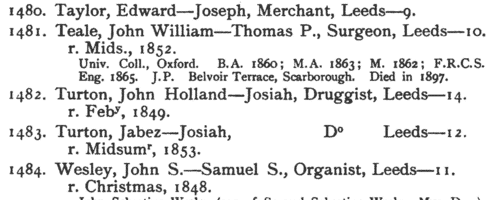
| Members of Oxford University
(1860)
The Oxford University Calendar for 1860 includes this list of all living members of the university, i. e. not only undergraduates and members of staff, but also all surviving graduates from earlier generations. The names are arranged alphabetically by surname, then by college in order of foundation. Surnames are given, initials, highest degree, name of college, and then the year of graduating the first degree. For undergraduates only name and college is given. An asterisk before a surname indicates a member on the foundation of the college. | Sample scan, click to enlarge
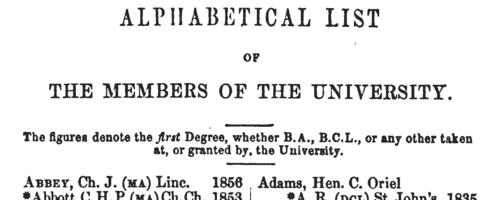
| Queen Victoria's Household
(1860)
This list of the Queen's Household comprises: The Lord Chamberlain's Department; Office of the Robes; Medical Department; Chapel Royal, St James's; Chapel Royal, Whitehall; Windsor; Hampton Court; Kensington; The Lord Steward's Department; Board of Green Cloth; Pay Office; Ewry; Wine and Beer Cellars; Kitchen; Confectionery; Pastry; Bake House; Coffee Room; Table Deckers; Silver Pantry; Coal Yard; Lamplighters; Gentlemen Porters; Porters; Stewards' Room; Servants' Hall; State Porters; Marshalmen; Coroner; Almonry; Gardeners; Yeomen of the Guard; Gentlemen-at-Arms; Master of the Horse's Department; and The Royal Hunt. | Sample scan, click to enlarge

|  Sailors and marines on board Her Majesty's ship Snake
(1860) Sailors and marines on board Her Majesty's ship Snake
(1860)
The China Medal was awarded to soldiers and sailors involved in the various actions of the war against China, in which this ship was engaged in 1860. The medals were either delivered on board or sent on in 1862: except that many of the men were no longer immediately traceable, and the remarks on the roll show that some medals were not sent on for several years, and some were never sent. | Sample scan, click to enlarge

| Boys entering Leeds Grammar School: Upper (Classical) Department
(1861)
The admission books for Leeds Grammar School from 1820 to 1900 were edited by Edmund Wilson and published in 1906. The series of registers is almost complete for the period, there being in addition admission registers for the Lower (or Commercial) Department from 1856 to 1865, and lists of boys in the school in 1856, and in the Commercial Department in 1861. The entries are arranged by date or term of admission: a sequential number is given first, then surname, christian name, and, after a dash, father's christian name, occupation, and address; another dash, and then the age of the boy at admission, and often his year of leaving (with the abbreviation r. for 'removed' or 'left'). r.* means left without notice; (o) or S. or Stranger or Foreigner indicates a boy not on the foundation. The editor was unable to divine the meaning of the abbreviation (Q) or the asterisks prefixed to most entries in 1856 to 1860, but dutifully copies them into the text. In smaller type he then proceeds, where possible, to add some information about the boy's subsequent career. | Sample scan, click to enlarge
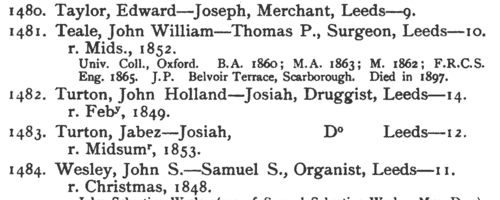
| Long-stay Paupers in Workhouses: Abingdon
(1861)
This comprehensive return by the Poor Law Board for England and Wales in July 1861 revealed that of the 67,800 paupers aged 16 or over, exclusive of vagrants, then in the Board's workhouses, 14,216 (6,569 men, 7,647 women) had been inmates for a continuous period of five years and upwards. The return lists all these long-stay inmates from each of the 626 workhouses that had been existence for five years and more, giving full name; the amount of time that each had been in the workhouse (years and months); the reason assigned why the pauper in each case was unable to sustain himself or herself; and whether or not the pauper had been brought up in a district or workhouse school (very few had). The commonest reasons given for this long stay in the workhouse were: old age and infirm (3,331); infirm (2,565); idiot (1,565); weak mind (1,026); imbecile (997); and illness (493). | Sample scan, click to enlarge

| Boys entering Leeds Grammar School: Upper (Classical) Department
(1863)
The admission books for Leeds Grammar School from 1820 to 1900 were edited by Edmund Wilson and published in 1906. The series of registers is almost complete for the period, there being in addition admission registers for the Lower (or Commercial) Department from 1856 to 1865, and lists of boys in the school in 1856, and in the Commercial Department in 1861. The entries are arranged by date or term of admission: a sequential number is given first, then surname, christian name, and, after a dash, father's christian name, occupation, and address; another dash, and then the age of the boy at admission, and often his year of leaving (with the abbreviation r. for 'removed' or 'left'). r.* means left without notice; (o) or S. or Stranger or Foreigner indicates a boy not on the foundation. The editor was unable to divine the meaning of the abbreviation (Q) or the asterisks prefixed to most entries in 1856 to 1860, but dutifully copies them into the text. In smaller type he then proceeds, where possible, to add some information about the boy's subsequent career. | Sample scan, click to enlarge
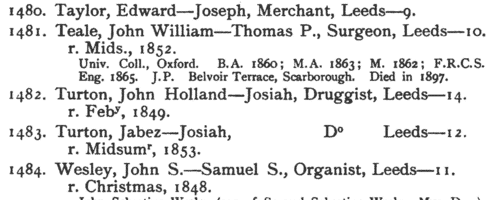
| Farringdon Missionary Contributions (1866)
Contributions (donations, legacies and collecting boxes) from 17 October 1866 to 19 November 1866 to the London Missionary Society. This index includes not only individual contributors but also local collectors and the ministers and treasurers reporting sums collected.
| Sample scan, click to enlarge

| Boys entering Leeds Grammar School
(1867)
The admission books for Leeds Grammar School from 1820 to 1900 were edited by Edmund Wilson and published in 1906. The series of registers is almost complete for the period, there being in addition admission registers for the Lower (or Commercial) Department from 1856 to 1865, and lists of boys in the school in 1856, and in the Commercial Department in 1861. The entries are arranged by date or term of admission: a sequential number is given first, then surname, christian name, and, after a dash, father's christian name, occupation, and address; another dash, and then the age of the boy at admission, and often his year of leaving (with the abbreviation r. for 'removed' or 'left'). r.* means left without notice; (o) or S. or Stranger or Foreigner indicates a boy not on the foundation. The editor was unable to divine the meaning of the abbreviation (Q) or the asterisks prefixed to most entries in 1856 to 1860, but dutifully copies them into the text. In smaller type he then proceeds, where possible, to add some information about the boy's subsequent career. | Sample scan, click to enlarge
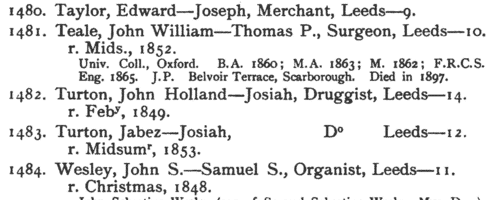
|
Research your ancestry, family history, genealogy and one-name study by direct access to original records and archives indexed by surname.
|












